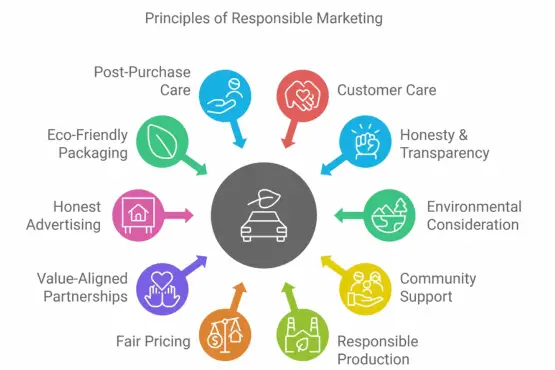Ethical trade means doing business fairly and responsibly. It’s about treating workers well, protecting the environment, and being honest with customers. This approach is more critical than ever before.
Why now? It’s not just because shoppers care more. Significant changes are happening in the business world:
- Companies are focusing more on being socially responsible (CSR).
- Investors are considering how companies treat people and the planet (ESG standards).
- Governments are making stricter rules about how businesses should behave.
- Global focus on sustainable business models is growing.
These changes are reshaping how companies market their products. It’s no longer enough to just talk about what a product does or how much it costs. Companies must show they do the right thing for people and the planet.
Why Ethical Trade Matters
Making Marketing Better
When companies act ethically, people trust them more, leading to improved marketing strategies that emphasize their corporate social responsibility.
This trust can lead to more sales and loyal customers, enhancing the effectiveness of ethical marketing strategies.
Being ethical can make a company stand out in a world where many products are similar.
Who Cares About Ethics?
- Investors: They want to put their money into companies that care about social and environmental issues.
- Customers: Many people, especially younger ones, buy from ethical companies.
- Governments: They’re making more rules about what companies can claim in their ads and how they should behave.
What Happens When Companies Aren’t Ethical?
Sometimes, companies get in trouble for not being ethical. For example:
- In 2013, a clothing factory in Bangladesh collapsed, killing over 1,100 workers. This led to big changes in how clothing companies check their factories.
- Some food companies have been sued for calling their products “natural” when they weren’t.
- A big social media company got in trouble for misusing people’s data.
These examples show that being unethical can hurt a company’s reputation and bottom line.
How to Market Responsibly
Responsible marketing is based on these ideas:
- Care about customers and communities
- Be honest about products, as transparency in business practices fosters consumer trust.
- Be open about how the business works
- Think about the long-term effects on the environment
- Help the communities where the company works

To use these ideas in marketing:
- Make products in a responsible way
- Set fair prices
- Work with partners who share your values
- Be honest in ads to align with ethical marketing strategies that resonate with socially conscious consumers.
- Use eco-friendly packaging
- Take good care of customers after they buy by implementing sustainable practices that enhance their experience.
Let’s look at how this works in different industries:
- Retail: Tell customers where materials come from and use transparent sourcing to reflect ethical considerations in business practices.
- Manufacturing: Use sustainable production methods that don’t harm the environment
- Technology: Protect people’s personal information and use AI responsibly
Many companies use the “triple bottom line” idea: People, Planet, Profit. This means caring about all three, not just making money.
Companies Doing It Right
Patagonia (Outdoor Clothing)
Patagonia ran an ad telling people not to buy their jackets. It sounds strange, but it worked. People liked their honesty and bought more from them.
How did this work?
- The ad explained how making clothes affects the environment, highlighting the importance of sustainable practices in marketing campaigns.
- It made people think about buying less but buying better quality.
- As a result, Patagonia’s sales increased by 30% the following year.
- The campaign also strengthened customer loyalty and attracted new environmentally-conscious customers.
Intel (Computer Chips)
Intel ensured they didn’t buy materials from places where armed groups profit from them, demonstrating strong labour practices in their supply chain. They checked all their suppliers carefully.
Here’s how they did it:
- They mapped out their entire supply chain.
- They visited mines and smelters to check conditions.
- They created a system to track materials from mine to product.
- They worked with other tech companies to develop industry-wide standards.
This took a lot of work, but it paid off. Intel became a leader in ethical sourcing, and other tech companies followed their example.
Salesforce (Business Software)
Salesforce gives 1% of its profits, 1% of its employees’ time, and 1% of its products to charity. They’re not afraid to speak up about social issues, even if it might upset some customers.
Results of their approach:
- Donated over $240 million to charities
- Gives employees 7 paid days off per year to volunteer, reinforcing their commitment to social impact and corporate social responsibility.
- Provided their software to over 40,000 non-profits for free
- Attracted and retained talented employees who care about making a difference
- Built a robust and positive brand image that resonates with customers and partners
Making Money and Doing Good
How to Do Both
- Think long-term: Ethical practices might cost more now but pay off later.
- Find new solutions to ethical problems
- Be open to challenges
- Listen to employees, customers, and communities
- Work with other organizations to solve big problems

Measuring Success
To see if you’re succeeding at both making money and doing good, look at things like:
- Net Promoter Score (NPS): This measures how likely customers are to recommend your company.
- Employee retention rates: How many employees stay with your company over time?
- Employee satisfaction surveys: Regular check-ins to gauge workforce happiness and engagement.
- Carbon footprint: How much your company’s activities affect climate change.
- Waste reduction metrics: Tracking how much you’ve reduced packaging or improved recycling.
- Ethical sourcing percentage: What portion of your materials come from certified ethical sources?
- Community impact measures: Jobs created, education programs supported, or local projects funded.
- Ethical certifications: Like Fair Trade, Rainforest Alliance, or B Corp status.
These measures and financial results give a complete picture of a company’s impact.
Challenges in Being Ethical
Common Problems
- Short-term profit focus: Some stakeholders only care about quick financial gains.
- Complexity: Ethical practices can be complicated, especially for big companies with global supply chains.
- Greenwashing concerns: People might think you’re just pretending to be ethical for marketing purposes.
- Measurement difficulties: It can be hard to quantify the impact of ethical practices.
- Cost concerns: Ethical practices often require upfront investments.
- Lack of internal buy-in: Not all employees or departments may see the value in ethical initiatives.

Real-World Examples of Challenges
- A coffee company claimed to source beans ethically but was found to be buying from farms with poor working conditions. This led to a public backlash and a drop in sales.
- An electric car maker promoted its vehicles as eco-friendly but faced criticism for the environmental impact of its battery production.
- A fashion brand advertised “sustainable” clothing lines but couldn’t provide clear evidence of how their practices differed from standard production methods.
Solving These Problems
- Education: Teach everyone in the company why ethics matter and how they benefit the business long-term.
- Clear business case: Show how ethics can save money, reduce risks, and enhance brand value over time.
- Transparency: Be honest with all stakeholders about your progress and challenges. Regular reporting builds trust.
- Incremental approach: Start with smaller ethical projects and build from there, proving value through strategic corporate social responsibility initiatives.
- Cross-functional teams: Get people from different company parts to work together on ethical issues.
- Third-party verification: Use independent auditors or certifications to validate your ethical claims.
The Future of Ethical Marketing
What to Expect
- Increased transparency: People will want more details about product origins and company practices as part of their demand for corporate social responsibility.
- Personalized ethics: Customers might choose which ethical causes a company supports based on their values.
- Circular economy focus: More emphasis on reusing and recycling products, not just making new ones.
- Employee advocacy: Workers will be more significant in communicating company values and practices.

New Technology
- Blockchain will help track products from source to consumer, increasing supply chain transparency.
- Artificial Intelligence: Can help predict ethical risks, personalize ethical marketing, and optimize sustainable operations for greater social impact.
- Internet of Things: This will provide more data on product usage and environmental impact, informing both design and marketing.
- Virtual and Augmented Reality Might let customers see firsthand how ethical practices work or the impact of their purchases.
New Consumer Trends
- Ethical shopping apps: More people use apps to check product ethics before buying, reflecting a shift towards corporate social responsibility.
- Supply chain transparency: Products with QR codes that show the entire supply chain are becoming popular.
- Durability and repairability: Customers ask for products that last longer and can be fixed, not just replaced.
- Values-based purchasing: Consumers are increasingly choosing brands that align with their values.
Industry-Specific Predictions
- Retail: Expect more “re-commerce” (reselling used items) and rental models to reduce waste.
- Finance: Growth in ethical investment products and transparency about where money is invested.
- Tech: Increased focus on data privacy and ethical AI development.
- Food and Beverage: More plant-based options and transparency about ingredient sourcing.
New Rules
Expect stricter regulations around:
- Environmental claims in advertising
- Supply chain transparency and modern slavery prevention
- Data privacy and ethical use of AI
- Extended producer responsibility for product lifecycle
Companies might face more considerable penalties for misleading ads about their ethical practices.
Conclusion
Ethical marketing is now crucial for business success. By being honest, open, and responsible, companies can build trust, improve their reputation, and grow sustainably.
Here’s what you can do:
- Audit your current practices: Use an Ethical Marketing Audit tool to assess where you stand.
- Set clear, measurable goals: Decide what ethical improvements you want to make. Use the SMART criteria (Specific, Measurable, Achievable, Relevant, Time-bound).
- Measure your progress: Use guidelines like the Global Reporting Initiative (GRI) Standards to implement regular sustainability reporting.
- Seek certification: Look into relevant ethical certifications for your industry (e.g., B Corp, Fair Trade).
- Educate your team: Provide training on ethical marketing practices and why they matter.
- Engage stakeholders: Regularly communicate with customers, employees, and investors about your ethical journey.
- Stay informed: Keep learning about new ethical practices and regulations in your industry.
Remember, being ethical isn’t just about following rules. It’s about making positive changes that benefit everyone.
The most successful companies of the future will be those that find creative ways to make money while incorporating ethical considerations into their business practices.
By taking these steps, you’re not just preparing your business for the future – you’re helping to create a better one. What ethical marketing practice will you implement first?




